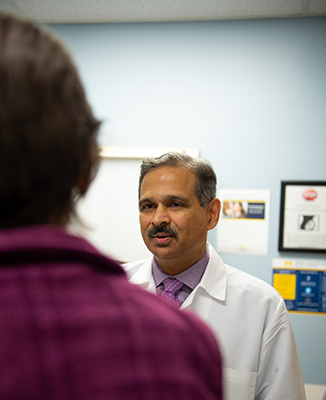COVID-19 Information for Cancer Patients

Michigan, like much of the rest of the world, is experiencing a health care crisis right now like we’ve never seen before.
Here in Southeast Michigan, we are experiencing a surge in people with COVID-19. The number of people needing care will soon be greater than our current hospital capacity. This has impacted how we are treating our patients with cancer during this difficult time. As more COVID-19 patients come into our health system, we must think carefully how to take the best care of our patients with cancer while protecting them from the virus.
COVID-19 may cause changes or delays in your cancer treatment.
Our Rogel Cancer Center providers are working together to deliver the best possible care during this challenging time.
If your provider suggests a change or delay in treatment, know that it reflects our need to balance treating your cancer and protecting you from the virus while caring for a large number of new patients with COVID-19. Our providers are staying up to date with national guidelines and best practices for adjusting cancer treatments in light of the challenge posed by the novel coronavirus -- and in some cases are helping to design frameworks for providing the best cancer care given the limitations imposed by the pandemic. Your care team will make the best recommendations possible to provide you with the most beneficial treatment while also reducing your risk of exposure to the virus.
We are increasing phone and video visits during this time to stay in touch. And are working to return to regular care regimens as soon as we are safely able.
In the meantime, our Patient and Family Support Services program offers many resources online or remotely, including guided imagery, music therapy and support groups.
Learn more about COVID-19 and cancer patients:
- Get the COVID-19 vaccine as soon as possible.
- Talk to your cancer doctor to learn if you're eligible for the third dose.
- Avoid large social gatherings and close contact with people who are sick
- Avoid unnecessary person-to-person contact, such as handshakes
- Avoid touching your eyes, nose, and mouth
- Wash your hands often with soap and water for at least 20 seconds, especially after going to the bathroom; before eating; after blowing your nose, coughing, or sneezing; and before and after coming in contact with others
- Get a flu vaccine
- Make sure you have access to several weeks of medication and supplies in case you need to stay home for prolonged periods of time
- Avoid cruise ship travel and nonessential air travel
Some types of cancer and treatments such as chemotherapy can weaken your immune system and may increase your risk of any infection, including the virus that causes COVID-19. During chemotherapy, there will be times in your treatment cycle when you are at increased risk of infection.
Adults and children with serious chronic health conditions, including cancer, are at higher risk of developing more serious complications from contagious illnesses such as COVID-19.
The US Centers for Disease Control and Prevention (CDC) has recommendations for People with Certain Medical Conditions, including:
